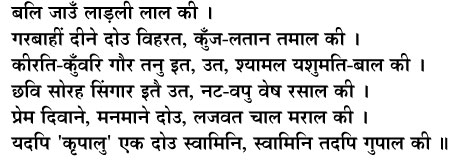Tu to hai sada se hi Govinda Radhey,
Kaal ras ab ras kaal bana dey.
(Synopsis of a talk given by Jagadguru Shri Kripalu Ji Maharaj on January 30, 2011, in Shyama Shyam Dham, Orissa, India, explaining this new kirtan verse)
There are two types of souls. The first are called swansh, and the second are called vibhinnansh. Those who are swansh include Brahma, Vishnu and Shiva, Saints like Narada and the divine Gopis of Golok. They are all eternally liberated from Maya. They have never been under the control of Maya. The word swansh is made up of “swa” or personal and “ansh” or part. This means these souls are an eternal part of God’s own personal power.
If you fill a pot with ocean water, the water inside the pot is a part of the ocean. The qualities of the water in the pot will be the same as the water in the ocean. If you were to drink a few drops of the ocean of amrit, the nectar that bestows immortality, you would receive the same qualities as the ocean of amrit. So a part has all the qualities of the whole to which it is related. Because swansh have eternally been personal parts of God, they have all the qualities of God.
The second type of soul is called vibhinnansh. “Vibhinna” means separated, so these are parts of God that are separated from God. If these parts belong to God, then why are they described as separated? They are referred to as separated because they have eternally remained turned away from God. What happens when you are turned away from God? Maya controls you. As a result of this, you forget your true identity as a part of God and that God alone is your everything. Such a person is identified with his body and he is attached to those who are related to his body. Due to this attachment, he forgets God.
When someone is turned away from God, he comes under the control of Maya. While under the control of Maya, he sins. After all, he is now overpowered by ignorance. Now he performs actions and is further bound by their consequences, and as a result, he remains stuck in the cycle of birth and death.
What is the solution for this? The one who is turned away from God has to turn towards God. Then what happens is the ignorance that makes you identify yourself as the body is dispelled and it is replaced with the knowledge that you are the soul.
Soul can’t have relationships with one another in the material world. For example, although waves keep on arising on the ocean, their permanent relationship is only with the ocean itself, not to each other. In this way, the souls are only eternally related to God.
Sometimes two waves meet, then one subsides. In other words, wave-to-wave relationships are temporary. The relationship between individual embodied souls, whether between a parent and child or a husband and wife is perishable.
Even if the roof of a house collapsed and all the members of a family died together, what would happen to each of them after death? All of them will go to separate destinations because the actions they performed during their lifetimes were all different. Each will receive a consequence in accordance with those actions. It is not that they will get the same parents, spouse or children again. Due to their different consequences, someone will become a dog, someone a donkey, someone will go do to the celestial abodes – all according to their past actions. There they will meet a new mother, a new father, have a new spouse, produce new sons and daughters. Again at the time of death, all these relations will be separated from each other and each will receive a new birth in accordance with their own past actions.
A train is going from your hometown to Delhi. On board are many different passengers. Each will get off at the station that is their final destination. Not everyone goes to Delhi. Even if they were all to get off at Delhi, they will all go to their respective homes in different neighborhoods and be separated. The world is just like this.
According to our own past deeds, God places us in the wombs of different mothers. God doesn’t force someone to be the son of a king and another to be the son of a beggar. He doesn’t force someone into the womb of a dog and make someone else a tree. God is not doing this whimsically. God grants to each of us a different birth based on our own individual past actions.
Even in human births there are great differences. If you are born to the wife of a meat-eating, alcoholic criminal, there is a good chance you will be like him. Your father will teach you his ways. “Son, why work for someone or have your own business? Rob a bank like me and you can become a millionaire overnight!” Another person is born to the wife of a Saint and starts saying God’s name from his very birth. Another person is born to rich parents and is pridefully intoxicated by this wealth. He laughs at the very mention of God. In this way, the type of rebirth we receive is according to our own individual past actions.
But when a person turns towards God, then Maya runs away from him. Then all of Maya’s relatives – lust, anger, greed, infatuation and so on – they all tie up their bedrolls at once and run away with Maya. This is like the way darkness runs away at the coming of light. No one is able to see it go; it just goes away. Similarly, once Maya goes away, these qualities will leave you forever. They can never return.
Once a person becomes God’s by fully turning towards Him, he becomes united with God. He doesn’t remain separated. Veda Vyas put all this philosophy into a single verse in the Bhagwatam,
“Bhayam dvitiya-viniveshatahsya-dishadapetasya-virparyayo smritih.”
(Bhagwatam 11/2/37) Turn towards God and Guru. Surrender to them completely and then Maya will leave. If you remain turned away from God, your mind will have a reversed understanding. You will identify yourself with the body and then have to suffer the consequences.
Both God and the soul reside in one place in the heart.
“Dwa suparna sayuja sakhaya samanam vriksham parikasvajatey.”
(Shvetashvatara Upanishad 4/6) But we do not receive His divine qualities even though both are in exactly the same place. God is actually seated within us.
“Ya atmani tishthati.”
(Vedas) Rather it could be said that He permeates us.
“Tailum tileshu kashteshu…”
(Vasudev Upanishad 1/1) God permeates the soul just as oil permeates a sesame seed, as fire permeates wood, as clarified butter permeates milk, as fragrance permeates a flower. God permeates the soul in a similar manner, but we are not benefiting from this. Why is that? Because we are turned away from Him.
God is telling us from within, “Child, come to Me. Don’t go in that direction.” But we respond, “No, I will go towards the world. Everyone is surrendering to Maya, so I will too. If there are a few Saints in the world saying to go towards God, the statements of a few could hardly be taken seriously.”
This is the mistake we have made since eternity. Don’t ask the question, “When did I turn away from God?” People use the logic that Maya overpowered them at some point because they turned away from God. They ask, “Why and when did I turn away from Him?” This didn’t happen on a particular day. Maya has had you in its grip since eternity.
However, if you but once turn towards God completely, that is, if you surrender to Him completely, Maya will leave you and never return. It will never control you again. This is the detailed meaning of this verse.
Read Full Post »














